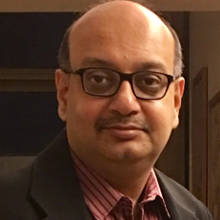[Photograph by Derek Keats from Johannesburg, South Africa under Creative Commons, via Wikimedia Commons]
It’s been over a month since the Tata-Mistry spat, easily the biggest showdown in Indian corporate history, hit the headlines. Anyone who has covered the last such major face-off in India Inc—between the Ambani siblings—will know that such bitter battles may not usually end anytime soon.
Having served as chairman for four years—and a director at Tata Sons for a decade—Cyrus Mistry is a quintessential insider. As former group strategist Nirmalya Kumar averred in a television interview earlier this week, Mistry knows where the bodies are buried. And in the next few weeks, we’ll hear more about murky goings-on inside the group that may have remained hidden from the public eye.
Now, here’s the moot point: just how long can Mistry sustain the pressure before his public campaign starts to flag and lose momentum? That would almost entirely depend on the ammo he unveils over the next couple of weeks as each of the group companies head towards the crucial extraordinary general meeting (EGM). While the tussle to win over influential retail investors is currently on, the final verdict will depend on which way institutional investors and domestic financial institutions like LIC vote. And that remains unclear.
Based on the goings-on inside Bombay House over the last one month, it appears Ratan Tata has clearly hardened its stance. And is now willing to stop at nothing to have the interloper summarily ejected from the various directorships at the Tata group. The trusted lieutenants have been simply asked to carry out his orders. It is now equally possible he may rest easy only after the Mistrys are forced to sell out their 18.4% stake in Tata Sons—and Cyrus steps down as director.
The Ambani slugfest was equally bitter, but the only difference was that there was a higher authority in the family—namely, Kokilaben, the matriarch—who was able to set in motion a mediation process, led by the redoubtable KV Kamath and aided by Nimesh Kampani. Very little insider information is known about what really transpired as part of that mediation process, except for a few stray references from Kamath in a television interview with senior journalist Shekhar Gupta. There, Kamath downplayed his role as a mediator, by saying that his only task was to get the two warring sides to talk and be willing to be part of a process. The brothers buried the hatchet and it eventually led to a formal separation of assets at one of the largest business conglomerates in the country.
Globally, mediation is now the preferred and one of the most important parts of any conflict resolution process. Increasingly, many people are discovering that sticking to a legal option is either time-consuming or hugely expensive. Sitting across the table is a great deal more expedient than the agony associated with doing the rounds of the courts.
In this case though, there are obvious challenges in store. Mistry hasn’t pursued any legal options, at least, not so far. The only legal threat—in the form of three separate legal notices served on Tata Sons and its group companies—has come from the original corporate samurai Nusli Wadia. Even if Mistry and Tata seem like punch drunk boxers intent on delivering the knock-out blow, there is little or no evidence to suggest that friends, group executives or even the family will step in to broker peace anytime soon. In fact, if anything, both sides seem to be fanning the fires.
Also, there’s been some loose talk about a possible settlement through a transfer of assets. So, for giving up control of Tata Sons, Mistry is assured control of one of the group companies, like Tata Power. Such talk may well be a tad premature. And frankly, Tata would be unwilling to give up control—and suddenly cut off ties to a group company—all to secure Mistry’s exit from Tata Sons. Instead, there’s been talk of support from a sovereign fund being drafted in to buy out the Mistrys, perhaps in partnership with Ajay Piramal.
Let’s assume that better sense prevails at some point and that mediation emerges as a possibility. Are there any essential conditions that need to be fulfilled to ensure that the two sides declare ceasefire—and stop firing any more bullets at each other? Consider a few:
One, there has to be a mutuality of interests that can be secured through the mediation process. It’ll go nowhere unless both parties see that their interests are best served through this process. The public humiliation that Mistry experienced—and the consequent damage inflicted on Tata’s reputation will be hard to erase. So perhaps the only starting point is if Tata assumes the father figure role, reaches out to Mistry and says he’s genuinely sorry about the way things turned out. Will that be too much to expect from the patriarch, who is, at the moment, leaving no stones unturned to turf out Mistry?
Two, there has to be considerable pressure from the larger ecosystem for a truce. Whether it comes from institutional investors, the threat of regulatory action, banks or even ordinary shareholders. So far, there’s been some action, both from institutional investors and calls for investigations by government agencies and regulators as well as a significant meltdown in valuations. But whether that translates into any real threat perception is anybody’s guess. And unless there is an imminent disaster looming large, the possibility of a mediation process delivering results is likely to be that much less.
Three, the mediator needs to have enough leverage to drive the agenda. One obvious challenge is to find someone who has the stature and the credibility to make both parties talk. For the moment, the Parsi community, the independent directors and even the trustees at the Tata Trusts are split down the middle. Even assuming that a mediator is found—let’s say, Tata group veteran Dr JJ Irani is acceptable to both sides—the real challenge at hand is to help reframe the core issues and steer away from seemingly intractable, strongly held ideological positions. Very often, people mistake a mediation process as finding a middle ground. In conflict resolution jargon, this is instead about discovering an alternative path.
For the moment though, this battle royale isn’t winding down anytime soon. If anything, Mistry will, in all likelihood, raise the pitch before the crucial vote is cast at the various EGMs.
(A shorter version of this column first appeared in Business Standard)

